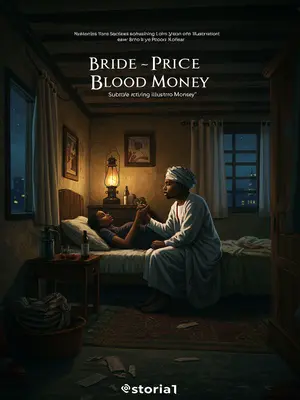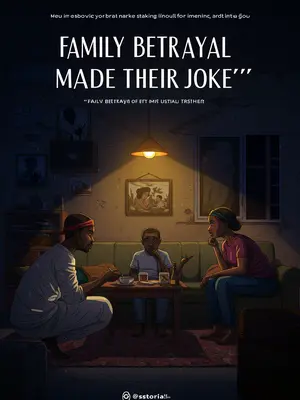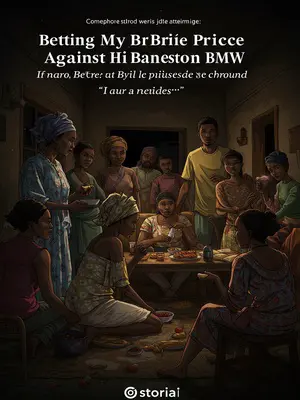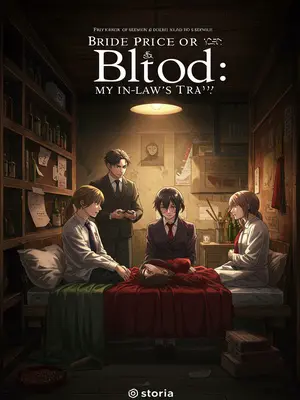Chapter 4: The Cost of Love
He was truly angry—Dapo even called out madam’s full name.
His voice echoed off the walls, full of rage and betrayal. For a moment, I almost felt sorry for him—almost.
Seeing my face go pale, he frowned a bit. Knowing I’d also been dragged into this wahala, he didn’t make things hard for me, just waved his hand for me to go.
He gestured weakly, his pride wounded. "Go, abeg. This one no concern you."
But before I could get off the bed, I was pushed down.
A rough hand on my shoulder, the sheets tangled around my legs. My breath caught in my throat.
“Oga?” Suspicion filled my face, but my lips were quickly covered, and a wisp of white smoke drifted in.
Before I could protest, a cloth pressed over my mouth. I tasted something bitter, and my vision blurred.
My mind went blank, until a bitter-tasting tablet was forced into my mouth and I woke up in shock.
I choked and sputtered, my senses returning in a rush. My heart raced as I realized what had happened.
Dapo’s eyes were ice-cold. After making sure I wouldn’t talk, he closed his eyes and said in a low voice, “Remove your clothes. I no go look. The reward is your deed of freedom and one hundred thousand naira.”
His words were hard, emotionless. The promise of freedom dangled in front of me like a carrot. My throat tightened with hope and shame.
He wanted to know what else they were plotting.
His plan was clear: let them think their scheme worked, then find out who was truly loyal.
I didn’t hesitate. I lay on the bed in my underclothes, red marks from being pinched still on my neck.
Shame burned on my skin, but I forced myself to go through with it. In this house, survival came first.
As a servant, one mistake fit end your life.
I remembered the stories of girls who disappeared after offending madam, their names never spoken again. I would not join them.
Freedom—I wanted it badly.
My heart beat faster at the thought. To be free, to walk the streets of Ibadan or Lagos without fear, to eat suya in the open air—was it too much to ask?
Oga lay on one side, the bed a mess, as if we had truly slept together.
He kept his distance, his face tight, like person wey chop bitterleaf soup by mistake. The sheets were rumpled, the air heavy with the scent of betrayal.
We lay side by side, but kept our distance.
Neither of us spoke. The silence was thick, almost suffocating.
We waited, not knowing how long, until I was half asleep and the door finally opened.
The minutes dragged on, each second stretching into eternity. My eyelids drooped, exhaustion pulling me under. Finally, the door creaked open.
In the darkness, someone picked me up, wrapping me in a wrapper.
Strong arms lifted me, the fabric soft against my skin. I smelled palm oil and sweat—familiar, comforting.
The familiar scent hit my nose. It was Musa.
I knew him by his scent alone. My heart twisted with longing and hurt.
The harmattan wind blew as the door closed. Musa held me, his eyes glued to the marks on my neck, lost in thought.
His hands trembled as he brushed my hair aside, his face shadowed by worry and guilt. The cold air bit at my skin, but his arms were warm.
For a moment, I wanted to open my eyes and ask him why, but I held myself back.
The question burned on my tongue, but I swallowed it. In this house, some things were better left unsaid.
Because I heard madam’s voice.
Her footsteps were sharp, her wahala enter room like NEPA light come back—sudden, blinding.
She was clearly angry that I’d ended up in oga’s bed. Her thin fingers pinched my waist, her voice shaking: “If I fit still get pikin, I for no let you take this chance.”
Her words were bitter, her grip cruel. I bit my lip to keep from crying out, refusing to give her the satisfaction.
The bitterness was clear, and the pain made me frown.
I clenched my jaw, determined not to show weakness.
At that moment, Musa finally spoke: “No vex yourself.”
He sighed and looked away, trying to calm her, but his words only made her angrier.
He was worried she’d get too upset, not even noticing that I was in pain.
He focused all his attention on madam, as if I was invisible. The realization stung more than the pinch.
In the end, Madam Yemisi hissed and left.
Her footsteps faded, leaving a trail of anger and resentment behind.
The familiar smell of palm oil filled my nose. I knew I’d been brought back to my room.
My small room, cluttered with the things Musa had given me—an old radio, a string of beads, a faded wrapper. It felt both safe and suffocating.
The chill from outside was gone, but I still couldn’t feel any warmth.
I wrapped my arms around myself, shivering despite the heavy blankets. The emptiness inside me was colder than any harmattan wind.













